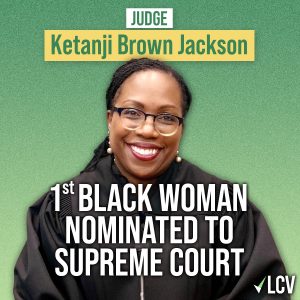Clean Energy Tax Incentives Can Help You Save Money — and the Planet
Apr 25, 2024
Judge Ketanji Brown Jackson’s historic nomination to the Supreme Court is a milestone in the fight for racial justice and equity. Her perspective and voice on the Court is vital to building a judiciary that reflects our country’s racial and gender diversity, and that serves all people, not just the polluters and other deep-pocketed special interests. Once confirmed, she will have a long-lasting impact on the most important issues of our time, like climate and voting rights, for decades to come. If she is confirmed and serves as long as her predecessor, she could remain on the Supreme Court until the year 2050 and beyond.

Jackson is a supremely qualified nominee. The Senate has previously confirmed her, with bipartisan support, to three major positions: the U.S. Sentencing Commission, the U.S. District Court for the District of Columbia, and the U.S. Court of Appeals for the D.C. Circuit. No other Supreme Court nominee in the past 30 years has earned the Senate’s confirmation on three prior occasions.
As the first former public defender ever nominated to the Supreme Court, Jackson’s long record both on and off the bench reveals a commitment to upholding justice for people and communities who are too often impacted by institutional inequities, not just powerful interests who can afford the most expensive representation. This experience, along with her perspective as the first Black woman to serve on the nation’s highest court, will add a critical voice that the Court has been missing for centuries.
Following the Supreme Court’s recent series of politically motivated, racist attacks on voting rights, which continue to marginalize the communities most impacted by both voter suppression and the climate crisis, the Supreme Court will soon issue a decision in West Virginia v. EPA. This case, brought by coal companies and their far right allies, is an attempt to gut the EPA’s ability to regulate greenhouse gasses under the Clean Air Act. The potential impacts of the Supreme Court’s decision are immense. In addition to limiting the EPA’s authority to fight air pollution that contributes to the climate crisis, it could imperil many federal agencies’ ability to protect the people from powerful special interests in other critical policy areas, such as the safety of our food and drugs, public health, and workers’ rights.
The fundamental building blocks of our society are at stake when appointing a Supreme Court justice who will serve for decades. The Supreme Court makes decisions that touch many aspects of our daily lives, so we need Justices that work for the people. Judge Jackson has shown that she will be a Justice for all.
In the short term, appointing Judge Jackson to succeed Justice Breyer won’t change the court’s six-member conservative majority, which is far to the right of the average person in this country. However, these are lifetime appointments and even the difference between a 6-3 Court and a 5-4 Court can have momentous consequences. Just 15 years ago, a Court that had a five-member conservative majority ruled that the EPA not only can, but must, regulate greenhouse gasses. The fact that today’s more conservative Court is considering preventing it while upholding voter suppression laws and weakening the Voting Rights Act shows how important every justice is.
President Biden and senators need to continue their outstanding recent run of appointing highly qualified, personally and professionally diverse judges, most of whom have spent their legal careers fighting for the people. Though Judge Jackson’s nomination to be the first Black woman and first public defender ever to serve on the nation’s highest court is a milestone in progress towards equal justice in our nation, our work to create a diverse judiciary cannot end with her. There are currently over 100 vacancies on the lower federal courts, and the judges who fill those seats will also play defining roles in future cases that shape our democracy and environment for decades to come.
Our judiciary has enormous impacts on our lives, and our federal judges serve for life. We urge the Senate to swiftly confirm Judge Jackson to the Supreme Court, and to accelerate the pace of confirmations of President Biden’s nominees to the lower courts, including distinguished public-interest lawyers such as Nancy Abudu and Dale Ho.
In this moment when the stakes for the air we breathe, the water we drink, the climate crisis, and our democracy are higher than ever, Judge Ketanji Brown Jackson can be trusted to uphold the promise of equal justice under law. She should be confirmed without delay.
Doug Lindner is LCV’s Advocacy Director for Judiciary & Democracy.